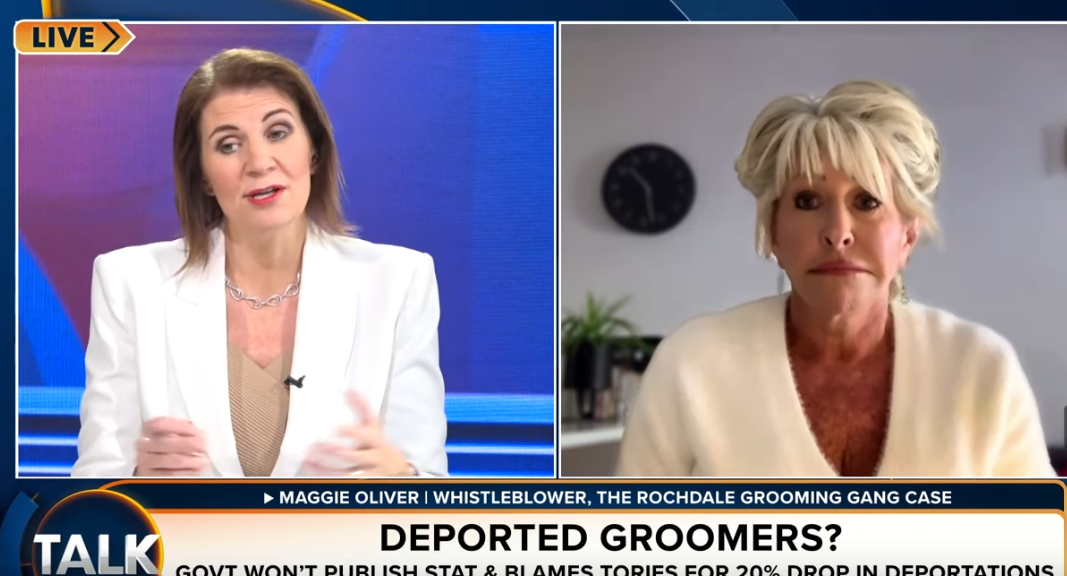“If It Were White Men Targeting Muslims, It Would Be Called a Race Hate Crime” | Julia Hartley-Brewer

During an interview with talk Tv, Maggie Oliver, a former detective with Greater Manchester Police and a whistleblower in the Rochdale grooming gang scandal, has spoken out in a powerful interview with Julia Hartley-Brewer, calling for accountability for decades of systemic failures to protect vulnerable children. Oliver’s comments follow a resurgence of public attention on grooming gangs, sparked in part by Elon Musk’s recent tweets.
“I am grateful for anything that brings this back onto a national platform,” Oliver said. “But what normally happens is we get a five-minute soundbite, and then it fades away. Meanwhile, children are being raped and failed by the authorities.”
Oliver described her experiences investigating the Rochdale case, where young girls were systematically groomed, raped, and trafficked by men of predominantly Pakistani heritage. The abuse, she said, was facilitated by the inaction of police, social workers, and other authorities.
“In 2005, I worked on a case where over 100 paedophiles were identified, but the investigation was shut down,” Oliver recalled. “Not one person was prosecuted. It left me traumatized, but it also opened my eyes to the institutional failures that continue to this day.”
She resigned from the force in 2012, citing what she called “gross criminal neglect” by those in power, and has since become an advocate for survivors through the Maggie Oliver Foundation.
Oliver emphasized that the ethnicity and religion of the perpetrators—predominantly Pakistani Muslim men—played a role in the lack of action by authorities. She also highlighted how the victims, often white working-class girls, were dismissed and dehumanized.
“If this was the Chief Constable’s daughter, would they call it a lifestyle choice?” Oliver asked. “These kids were cast on the scrap heap. Nobody was fighting their corner. It was about class and ethnicity—they got away with it because they thought these girls didn’t matter.”
Hartley-Brewer pointed out shocking examples of neglect, including cases where social workers facilitated Islamic marriages between victims and their abusers. Some girls were subjected to horrific abuse, including branding, torture, and rape, with no intervention.
Oliver criticized the excuses made by authorities, who claimed that addressing the issue would stoke racial tensions. “The reality is, if the perpetrators had been white, they would have been prosecuted,” she said.
She also took aim at former Director of Public Prosecutions (DPP) Keir Starmer, who oversaw cases like Rochdale. “He worked with the chief Crown prosecutor on the Rochdale case, but the charges weren’t serious enough,” Oliver said. “They took the easy route, and those men were meant to be deported, but they weren’t.”
Oliver expressed frustration with the Independent Inquiry into Child Sexual Abuse, which she described as too broad and ineffective. “The victims and whistleblowers didn’t get a look in,” she said. “It was the same senior officers and social workers responsible for the failures who were given the platform to speak.”
Oliver called for an overhaul of the system, starting with holding those in power accountable. “The men who did this are still out there, not being arrested, prosecuted, or deported,” she said. “We need action, not more inquiries or reports.”
She also challenged the narrative that raising these issues aligns with far-right rhetoric, asserting that it is about justice for victims. “I don’t care where an abuser comes from—this is about children’s lives being destroyed, and it’s criminal on every level that it continues.”
Oliver’s interview has reignited calls for a national inquiry to address grooming gangs comprehensively. “This isn’t just about the past,” she warned. “It’s happening right now in 50 towns and cities across the UK.”
As public anger grows, many are demanding that the government take decisive steps to protect vulnerable children and ensure that those responsible for enabling abuse are held accountable. “The victims deserve justice, and the system needs to change,” Oliver concluded.




